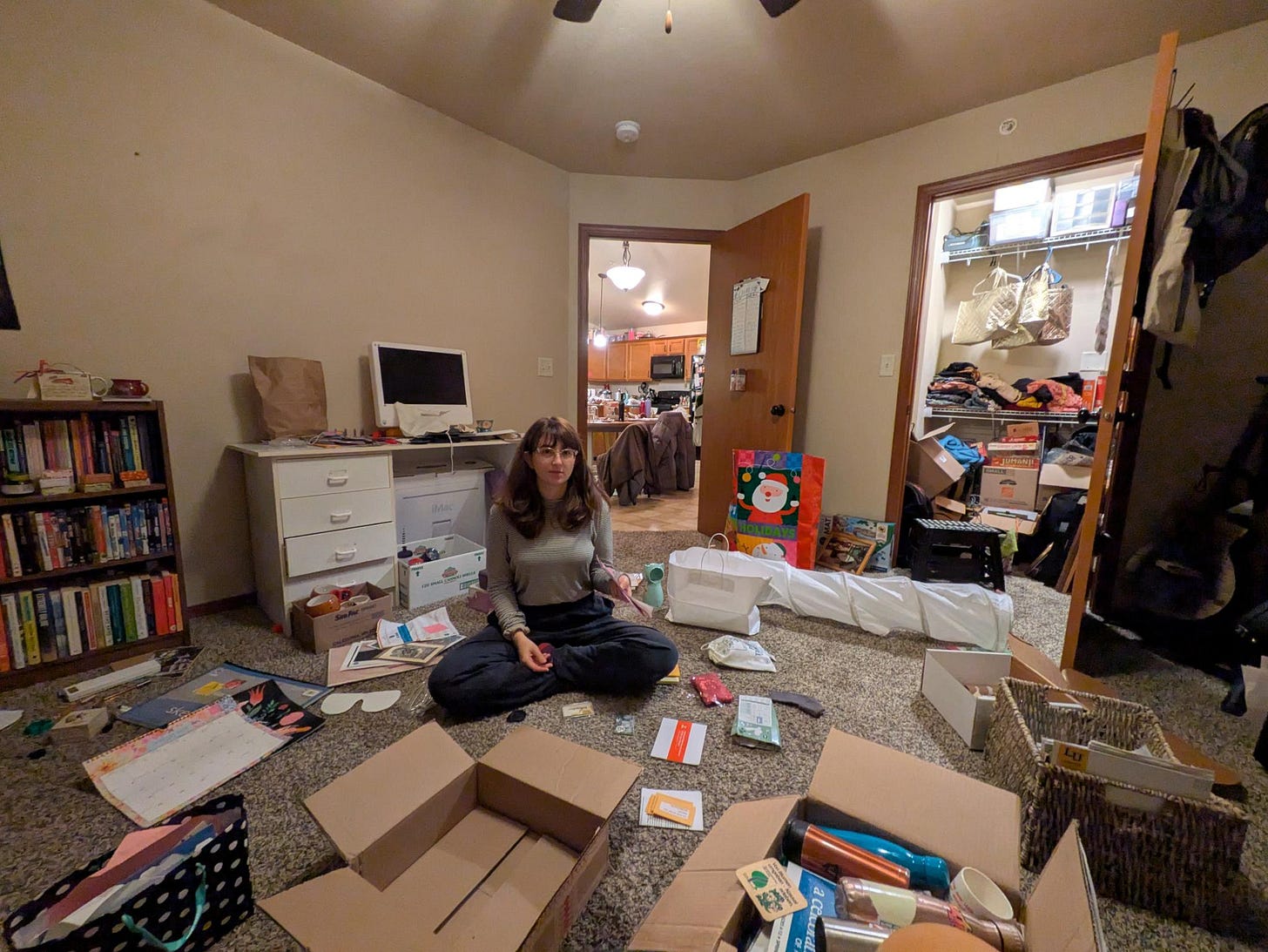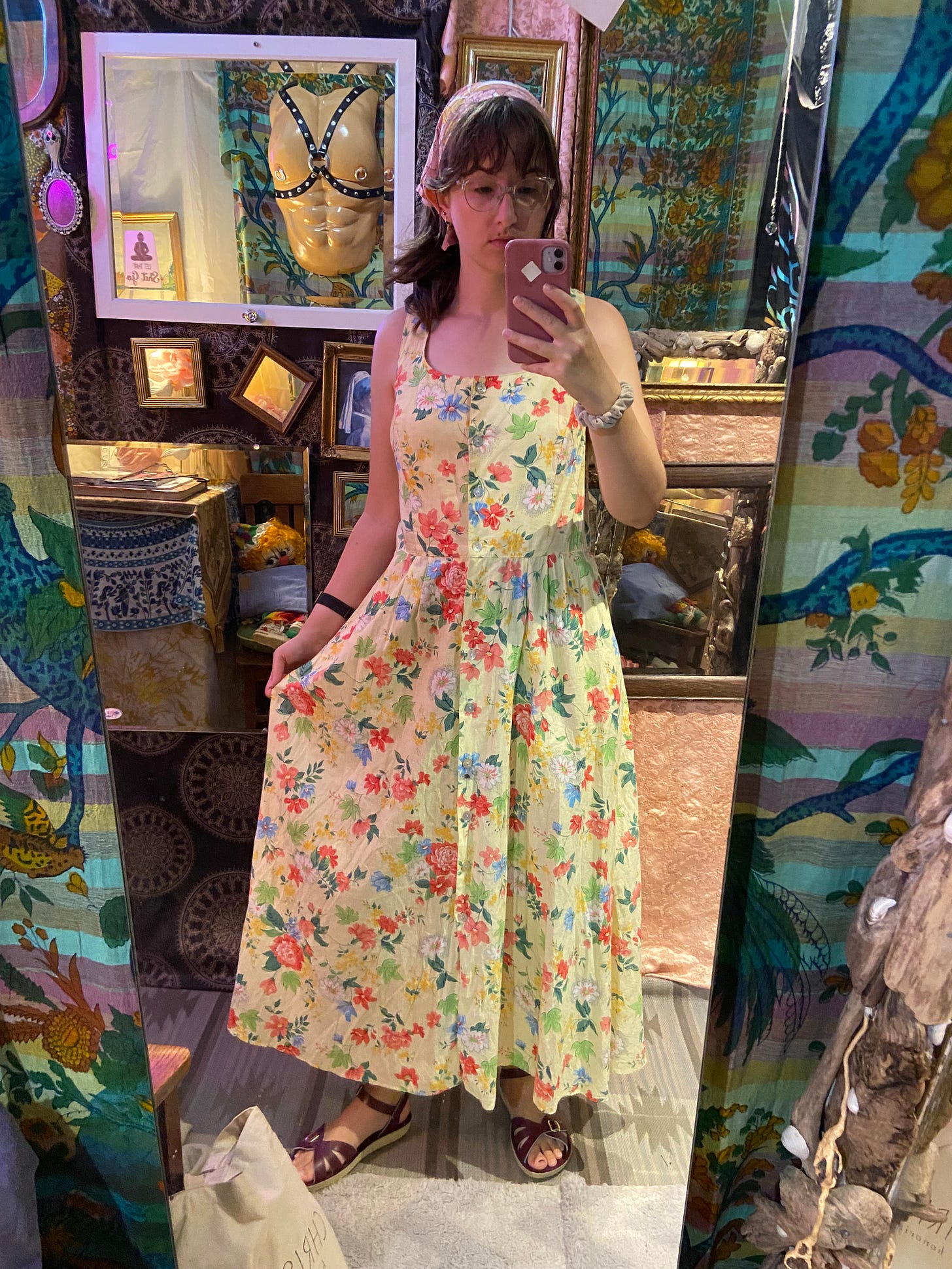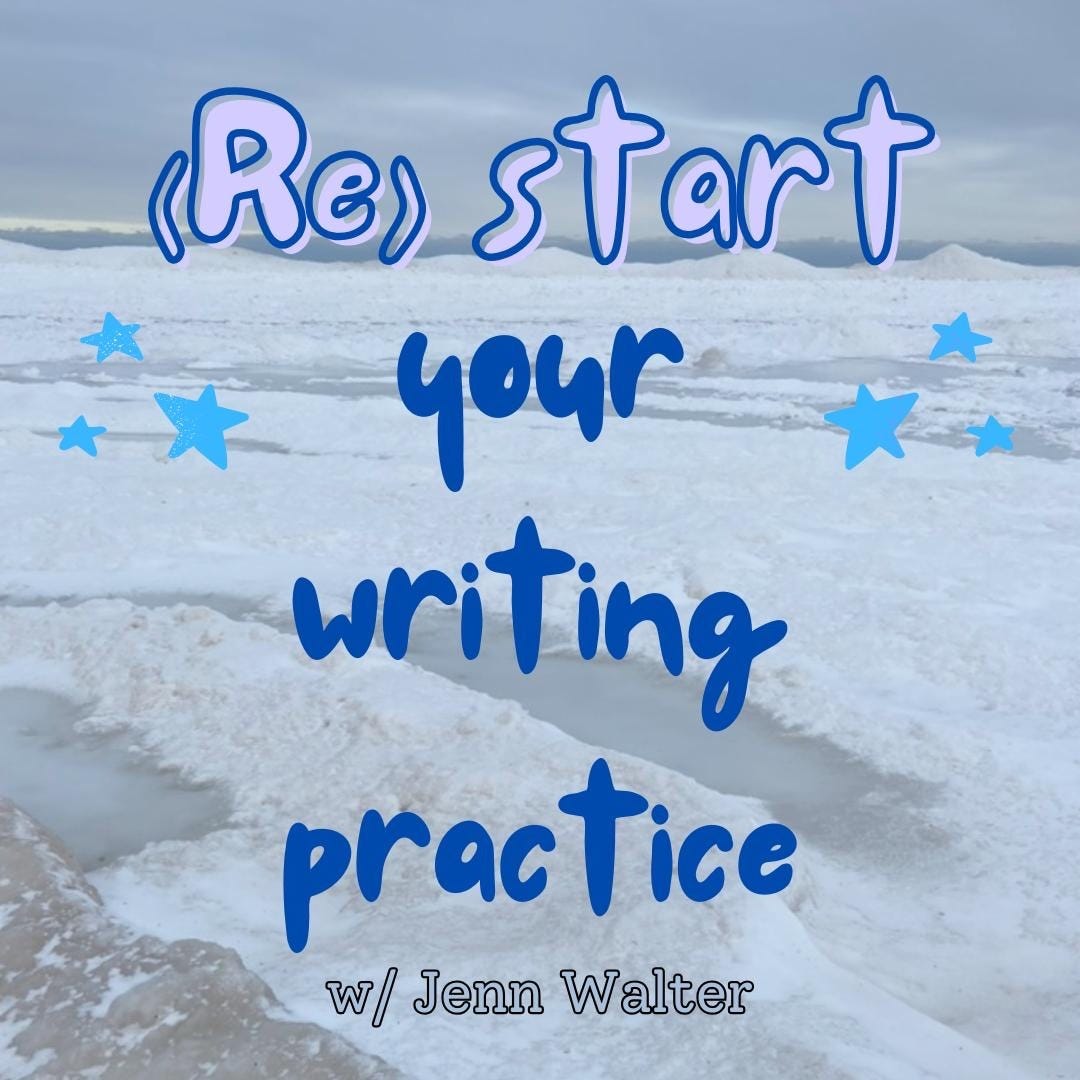The grasp of consumerism is hard to escape, especially in the U.S. where shopping is a literal pastime. Even if you’re someone who doesn’t have a lot of space to store things, or who wants to save money, or who cares about the environmental impact of shopping all the time, I’m sure you’ve fallen victim to a great sale or an ad for a little doodad on social media that you just had to have.
My own shopping habits are nothing to idolize. During the early years of Covid, having nowhere to go and nothing to spend my money on, I blew thousands of dollars on clothes. Yes, thousands — I kept a spreadsheet of everything I bought so I know the totals, which are too embarrassing to share here. (The spreadsheet came to be when I realized my shopping habits were getting out of hand.)
From 2020-2023, my closet filled up quickly with Poshmark and Depop orders and shipments from indie clothing brands I found on Instagram. Before I knew it, I ran out of hangers for all my floral dresses and racks for my growing mountain of colorful sweaters. But it was just so much fun to collect clothes. Having a carefully curated and frankly amazing closet became part of my identity, and I even had a whole Instagram page to showcase my outfits.
Then, the excitement faded. By 2024, I was going to events again, traveling, and spending more time with new people. The rush of snagging a new piece on clearance from a luxury slow fashion brand I could barely afford was no longer at the forefront of my mind. Collecting clothes, while still an occasional hobby, is no longer a central facet of my identity.
And that leads me to today — buried under piles of things I bought years ago, and wondering where to put it all. Thankfully, winter offers a bit of a reprieve in activity (when it’s sub-zero outside like yesterday, there’s barely any reason to leave the house). So I’ve been focused these past few months on decluttering and getting rid of things I no longer use.
The crazy thing is that clothing is just one category of stuff that I own. My apartment is full of objects that bring me joy, like books and games, plus tools I use every day, like my cookware. Every closet in here is full of seasonal gear, keepsakes, and random supplies, like the tape gun I use to pack up boxes. And there are some dark corners that I don’t like to visit, which hold containers of crap that were shoved away during our last move. I’m not even completely sure what’s in them.
At some point it dawned on me that this collection of things will only grow over the years. I’m only in my 20s, and sometimes it shocks me how much stuff I already own. The very American solution to this problem is to simply get a bigger living space or a storage locker. But both are simply a crutch to avoid the deeper issue: we don’t need all of these things.
Decluttering — as well as consuming less stuff — is the real solution to this problem. Lately I’ve been focused on the former. Decluttering shouldn’t be a practice that’s done once in a lifetime, or only as the result of a big life change, like a breakup or a move. If we are accumulating things, we also should be figuring out which old things we no longer need.
Why does any of this matter? Well, for one, it saves a huge headache for our future selves.
A few years ago, Ryan and I spent a very long day helping his parents clean out their house of 25 years. After emptying every room, closet, and inch of attic space, we found so many decorations and old books and busted electronics that nobody wanted or even remembered were there. The pile of trash on their front lawn stretched halfway down the block — it was a remarkable amount of stuff to throw away. It was also a painfully long day of cleaning, which probably would not have been the case if much of that old stuff was no longer in the house.
It also haunts me how many things we threw away that day that probably didn’t have to go to the landfill. But when you’re rushing to get the moving van packed, you don’t have time to think about donating the salvageable stuff.
I’ve seen similar scenarios play out with other people I know. Every time I help clean out a dead relative’s house or a friend or family member’s place during a big move, we always unearth so much stashed-away, unused crap. Why do we do this? Why can’t we get rid of these things before they cover every inch of our living space? Why make moving day such a damn headache?
Maybe you haven’t had the experience of going through someone else’s treasure trove of forgotten objects, but once you’ve done it a few times it gets exhausting. Seeing the clutter in other people’s lives makes me determined to avoid ending up in the same situation several decades from now. Don’t get me wrong, I will still be a consumer who buys things for fun — but I want to build a better exit strategy for my stuff so it doesn’t end up as mindless clutter.
This winter, Ryan and I have started getting rid of a lot of things we no longer use. For me, much of that’s been from the pile of unworn and excess clothes that I bought during the pandemic. Some items I’ve listed on online resale sites, while others I’ve boxed up and donated to the local thrift store that does a monthly clothing giveaway.
It was hard at first to give up some of that stuff. It felt like I was closing the door on a chapter of my life that I didn’t want to end; one where I was more generous with my spending and focused on my fashion hobby because it helped me cope with the state of the world. But I know I can’t keep buying clothes at the rate I was forever. I have other financial goals now, and spending frivolous amounts of cash on cute wearables isn’t sustainable. (Nor is it sustainable in an environmental sense.)
Letting go has had an interesting side effect: I don’t feel as attached to my stuff anymore. When I got over that initial hump of selling and donating my unworn garments that I miiiiiight wear someday (but realistically won’t), I started to feel open to even more decluttering. That greedy gremlin that tells me to hoard stuff because I don’t know when I might need it got easier to ignore the more I got rid of things.
Shopping, too, has lost a bit of its luster — at least for now. I don’t feel like buying new stuff when I’m constantly rediscovering old stuff. Some of the things I’ve planned to sell or get rid of from my closet have actually found a new life on my hangers. If you forget about something for long enough, it can feel brand new when you rediscover it.
Over the next few months, I’m planning to dig through some other stashes while the weather still sucks. Craft supplies are overdue for a overhaul, and I own quite a few books that I know I’m never going to read. There’s also the dark corners of forgotten objects in my office closet and the trundle under the couch that make my stomach buzz with anxiety just thinking about them. But if I don’t brave the clutter now, it’ll become tomorrow’s pile of trash.
My new class, (re)start your writing practice, is this weekend! Come kickstart your 2025 writing routines with me at Wordhaven Bookhouse in Sheboygan on Jan. 25.
If you:
Let creative projects slide in the past few months and want to find your way back
Crave new writing routines in 2025 that feel fulfilling and manageable to maintain
Have never had a regular writing routine and need somewhere to start
Are facing creative roadblocks and want guidance on how to overcome them
Are seeking community, conversation, and scheduled creative time with other writers
This class is for you!!
Buy tickets here — only $10 per attendee.
Next week, we’ll be meeting virtually! So whether you live far away or just prefer a digital meetup, you can join us on Feb. 1 at 12pm CST. Buy tickets here.
Click here to learn more about the class and why I care so much about it.
Want to make a difference in 2025? Get on my supporter list by making a donation via Ko-Fi!
Anyone who supports this newsletter by any amount will have their name at the bottom of all future newsletters this year.
This newsletter will always be free to read and share, but I rely on the generous donations of readers to build financial security and keep this project going long-term.
Huge shoutout to my 2024 supporters:
Dennis T.
KRW
Grandma Gin Gin
Tara Y.
Murphy Kaye
Maddie B.
Mom
Emma H.
Molly G.
❤️❤️❤️







I liked the underlying sentiment in this post about how our consumption habits change as our values change. I think that’s why a lot of resolutions like “no buy” years fail because people didn’t change their values beforehand. I’ve been decluttering some books lately to donate to little free libraries and it feels so good knowing I’m making space for a more homey environment where I have more space to move around. There were downsides to moving a lot in my 20s but one of the upsides was that my space never felt cluttered with too much stuff — a dilemma I now face.